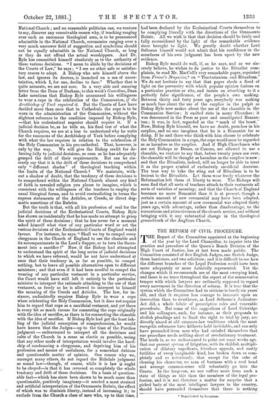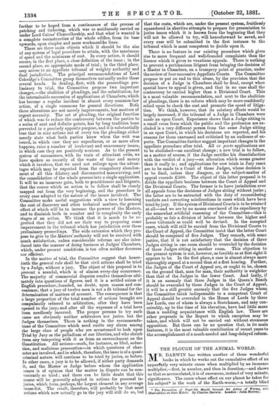THE REFORM OF CIVIL PROCEDURE.
THE Report of the Committee appointed at the beginning of the year by the Lord Chancellor, to inquire into the
practice and procedure of the Queen's Bench Division of the High Court of Justice, has at last been made public. The Committee consisted of five English Judges, one Scotch Judge, three barristers, and two solicitors ; and it is difficult to see how the different branches of the Legal Profession could have been more adequately or more faithfully represented. Yet the changes which it recommends are of the most sweeping kind, and there is no trace throughout the report of the conservative temper with which lawyers are ordinarily supposed to regard every movement in the direction of reform. It is true that the system which the Committee had to criticise is barely six years' old, and that it requires less courage to innovate upon an innovation than to overthrow, as Lord Selborne's Judicature Act did, a whole fabric of prescriptive rules and venerable precedents. But some of the suggestions of Lord Coleridge and his colleagues, such, for instance, as their proposals to abolish pleadings and to limit the right to trial by jury, are directly aimed at old common-law traditions which the most energetic reformers have hitherto held inviolable, and can only have proceeded from men who had satisfied themselves that our procedure needs nothing short of revolutionary treatment. The truth is, as we endeavoured to point out some weeks ago. that our present system of litigation, with its childish multipli- cation of dilatory expedients, frivolous appeals, and costly futilities of every imaginable kind, has broken down so com- pletely and so notoriously, that except for the sake of clearing his character, no man of business with a cool head and average common-sense will voluntarily go into the Courts. In the long-run, no one suffers more from such a state of things as this than the members of the legal pro- fession, and it is not therefore a matter for surprise that a picked body of the most intelligent lawyers in the country, should have persuaded themselves that there is nothing
• Republished by Longman.
further to be hoped from a continuance of the process of patching and tinkering, which was so assiduously carried on under Lord Cairns' Chancellorship, and that what is wanted is a complete reconstruction of the whole edifice, from its base upwards, upon simpler and more workmanlike lines. There are three main objects which it should be the aim of any system of legal procedure to attain, with the maximum of speed and the minimum of cost. In every action, it should secure, in the first place, a clear definition of the issue ; in the second place, an appropriate mode of trial ; in the third place, easy access to an appellate tribunal of weighty authority and final jurisdiction. The principal recommendations of Lord Coleridge's Committee group themselves naturally under these several heads. In dealing, first, with the proceedings pre- liminary to trial, the Committee propose two important changes,—the abolition of pleadings, and the substitution, for the interminable succession of applications at Chambers, which has become a regular incident in almost every common-law action, of a single summons for general directions. Both these alterations are not merely improvements, but matters of urgent necessity. The art of pleading, the original function of which was to reduce the controversy between the parties to a series of neat and definite points, has by long tradition been perverted to a precisely opposite purpose, and it is substantially true that in nine actions out of every ten the pleadings either merely state what both parties knew when the writ was issued, in which case they are superfluous, or as more often happens, raise a number of irrelevant and unnecessary issues, in which case they are positively noxious. As to the present system of summonses, with its train of attendant evils, we have spoken so recently of the waste of time and money which it involves, that we need not enlarge upon the advan- tages which may be expected from the compulsory abandon- ment of all this dilatory and disconnected manoeuvring, and the consolidation of the whole process into a single application. It will be an immense gain, both to practitioners and litigants, that the course which an action is to follow shall be clearly mapped out from the very beginning, and the procedure in every case adapted to the nature of the issues involved. The Committee make useful suggestions with a view to lessening the cost of discovery and other technical matters, the general effect of which will be to increase the powers of the Masters, and to diminish both in number and in complexity the early stages of an action. We think that it is much to be re- gretted that they did not see their way to proposing some improvement in the tribunal which has jurisdiction over these preliminary proceedings. The wide extension which they pro- pose to give to the Masters' authority will not be received with much satisfaction, unless considerable reforms are also intro- duced into the manner of doing business at Judges' Chambers, which, under present conditions, is too often neither decorous nor efficient.
In the matter of trial, the Committee suggest that hence- forth the general rule shall be that civil actions shall be tried by a Judge, without a jury. The object of this proposal is to prevent a scandal, which is of almost every-day occurrence. The majority of commercial disputes resolve themselves ulti- mately into questions of figures, and it is a settled axiom of English procedure, founded, no doubt, upon reason and con- venience, that a jury of twelve men is not a fit tribunal for the determination of matters of account. The consequence is that a large proportion of the total number of actions brought are compulsorily referred to arbitration, after they have been opened to the jury,. and after all the expenses of a trial have been needlessly incurred. The proper persons to try such cases are obviously neither arbitrators nor juries, but the Judges themselves. There is nothing in the recommenda- tions of the Committee which need excite any alarm among the large class of people who are accustomed to look upon Trial by Jury as the palladium of our liberties, and who shrink from any tampering with it as from an encroachment on the Constitution. All actions—such, for instance, as libel, seduc- tion, and malicious prosecution—in which questions of char- acter are involved, and in which, therefore, the issue is of a quasi- criminal nature, will continue to be tried by juries, as before. In other cases, a jury is to be allowed, if either party demands it, and the Master or Judge before whom the application comes is of opinion that the matter in dispute can be con- veniently so tried ; and there can be little doubt that this course will be generally adopted in actions for personal in- juries, which form, perhaps, the largest element in any average cause-list. The result, therefore, will probably be that most actions which now actually go to the jury will still do so, but that the costs, which are, under the present system, fruitlessly squandered in abortive attempts to prepare for presentation to juries issues which it is known from the beginning that they will not be allowed to try, will henceforward be saved, and every case will be submitted in the first instance to the tribunal which is most competent to decide upon it.
There is no feature in our existing procedure which gives rise to more frequent and well-founded complaints than the licence which it gives to vexatious appeals. There is nothing to prevent a pertinacious litigant from bringing the decision of a Master in Chambers, on a trumpery point of practice, under the review of four successive Appellate Courts. The Committee propose to put an end to this abuse, by the provision that the decision of a Judge in Chambers shall be final, except when special leave to appeal is given, and that in no case shall the controversy be carried higher than a Divisional Court. This is a most valuable recommendation, and next to the abolition of pleadings, there is no reform which may be more confidently relied upon to check the cost and promote the speed of litiga- tion. We think, however, that its salutary effects would be largely increased, if the tribunal of a Judge in Chambers were made an open Court. Experience shows that a Judge sitting in a small room from which the public and the profession are ex- cluded is a very different person from the same Judge sitting in an open Court, in which his decisions are reported, and his reasons for them canvassed and criticised by an audience of ex- perts. The Committee further suggest important changes in the appellate procedure after trial. All ex parte applications are to be abolished—an excellent change ; a new trial is to follow, as a matter of course, if the Judge certifies his dissatisfaction with the verdict of a jury—an alteration which seems greater than it really is ; and applications for new trials in Jury cases are to be made to a Court of three Judges, whose decision is to be final, unless they disagree, or the subject-matter of appeal exceeds £500. The object of this latter proposal is to divide the appellate business between the Court of Appeal and the Divisional Courts. The former is to have jurisdiction over all appeals from the decisions of Judges sitting without juries ; the latter are to be entrusted with the duty of reconsidering verdicts and correcting misdirections in cases which have been tried by jury. If the system of Divisional Courts is to be retained at all—and we are by no means convinced of its expediency by the somewhat artificial reasoning of the Committee—this is probably as fair a division of labour between the higher and lower tribunals as could well be devised. In the excepted cases, which will still be carried from the Divisional Courts to the Court of Appeal, the Committee insist that the latter Court should be composed of five Judges. They remark, with some justice, that it is not satisfactory that the decision of three Judges sitting in one room should be overruled by the decision of three Judges sitting in another room. This objection to the present system is not, however, as forcible as at first sight it appears to be. In the first place, a case is almost always more thoroughly argued at a second than at a first hearing. Further, the Judges of the Court of Appeal are, or ought to be, chosen on the ground that, man for man, their authority is weightier than that of the Judges in the lower Court. And lastly, if it is an anomaly that three Judges in the Queen's Bench should be overruled by three Judges in the Court of Appeal, it will be a still greater anomaly that the five Judges whom the Committee think indispensable to a competent Court of Appeal should be overruled in the House of Lords by three law Lords, one of whom is always a Scotchman, and may con- ceivably, up to the time of his elevation, have had little more than a nodding acquaintance with English law. There are other proposals in the Report to which exception may be taken, and which will not be carried out without strenuous opposition. But there can be no question that, in its main features, it is the most valuable contribution of recent years to the accomplishment of a much-needed and long-delayed reform.



































 Previous page
Previous page